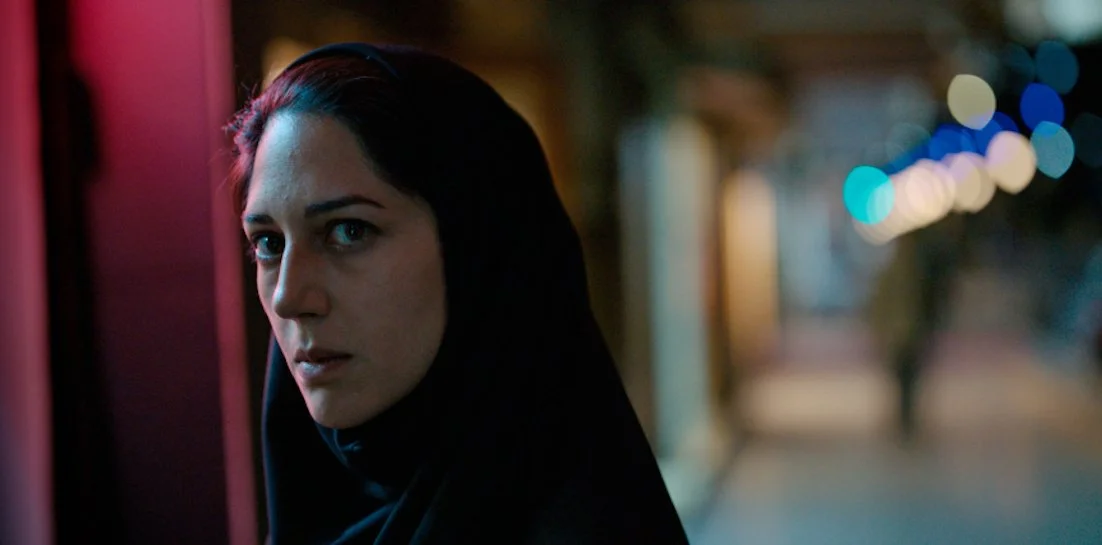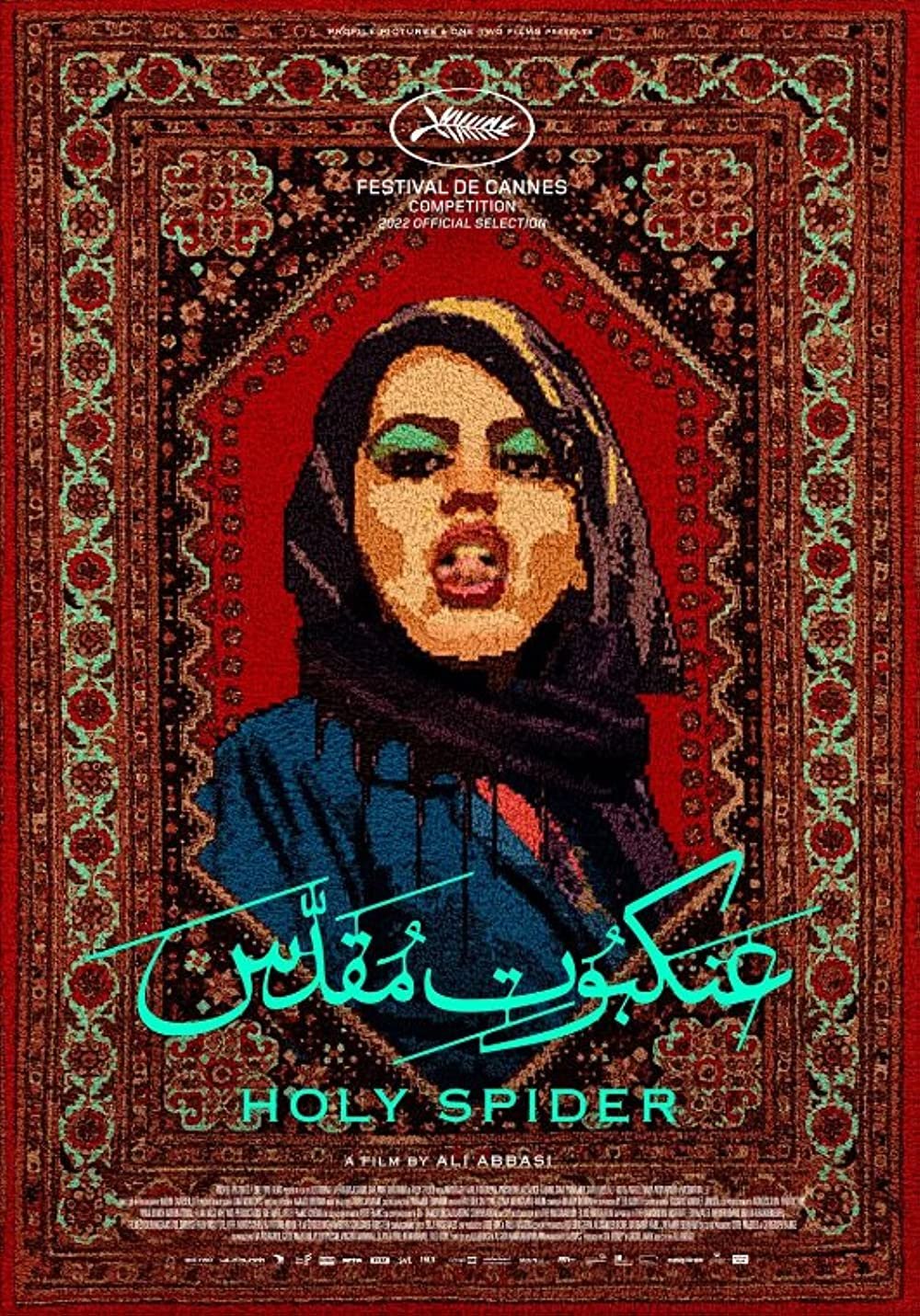Review: HOLY SPIDER (2022)
The Truest Horror Of Ali Abassi’s Film
Saeed Hanaei murdered and disposed of the bodies of sixteen women in Mashad, Iran between 2000 and 2001. An overwhelming conservative response, hailing the “cleansing” killer, led many to believe he was enacting a religious fatwa against unholy women… because all the victims were sex workers, and the police seemed to have no intention of catching the killer.
Ali Abassi’s film HOLY SPIDER is based on those true events.
Viewers follow the woman journalist, Rahimi, as she leans on officials to do the detective work and make an arrest, all the while revealing the flaws in the justice system and culture that allows crimes against women to go unchecked.
At Fantastic Fest in September 2022, Ali Abassi won the award for Best Director, and at Cannes, Zar Amir Ebrahimi won Best Actress.
There’s plenty to fear in this serial killer film—most notably, that it’s not really a serial killer film. Like Abassi quoted in her press kit for Cannes, “I wanted to make a movie about a serial killer society. It is about the deep-rooted misogyny within Iranian society, which is not specifically religious or political but cultural.” And she nails it. The running current throughout the film is the concept that nearly everyone believes she deserves it.
The first, most obviously frightening is that all the systems are predicated on misogyny, and all of the systems are inextricably woven together. The clearest example of that crossover in HOLY SPIDER is the Judge (Nima Akbarpour). He rules over court cases like that of the Holy Spider, but he’s also an official in the local mosque. That dual role makes the reporter Rahimi’s (Zar Amir Ebrahimi) questions of him especially important.
Rahimi says in a non-confrontational tone (all things considered) that because his victims are sex workers, many people assume that the Holy Spider is “carrying out a fatwa.” The Judge says that “even if it was a fatwa, which it wasn’t, it would be a religious recommendation, not a command.”
For those unfamiliar with it’s essentially a religious recommendation to commit a civil deed. Those who are very devout take the fatwa seriously, and the fact that a government official like the judge is the very same person who can issue such a fatwa is terrifying, even if he allegedly did not issue this one.
You’ve likely heard news of another fatwa lately, particularly the one calling for Salman Rushdie’s death after the publication of his novel, The Satanic Verses. Though the fatwa was issued upon the book’s publication 34 years ago, Rushdie was stabbed this past summer before he gave a lecture. He lives, but just last week, Rushdie’s agent went on record that as a result of cut nerves, Rushdie has lost sight in one eye and the use of one hand.
Fatwa are serious, and they are ubiquitous. And even in this work of historical fiction, HOLY SPIDER, they’re not to be taken lightly, yet the Judge’s dismissal of the fatwa question is quick, and then he turns his orders on Rahimi. He says, I won’t allow you to “turn this into a scandal” and instill fear in all the people of the holy city.
It’s not the first time the Judge has made this veiled threat, either: Rahimi’s fellow reporter, Sharifi (Arash Ashtiani), says from the very beginning, “I’ve been told to steer clear of religious stuff.” Never mind that the crimes themselves appear religious in nature—more on that to come.
Rahimi responds to the Judge’s order that “People are already afraid,” which articulates most viewers’ reactions: not reporting on a violent crime does not undo the crime.
Speaking of the ethics of journalism and how all systems are inextricably bound through misogyny, Rahimi is the only professional woman in this film whose profession is not sex work. While that status seems antiquated and foreign, the exposition we see at our introduction helps us understand how: first, there’s the morality police.
For those uninformed, the morality police are an actual branch of the actual police in Iran. Their role is to ensure that women act morally. One facet of that is to enforce the Islamic Republic’s strict rules on how to dress. That includes making sure that women wore their hijab correctly when out of their own residences. By their establishment, a head scarf should cover all of a woman’s hair, her ears, and sometimes even her chin.
If this is sounding familiar, too, it’s because the morality police and Iran’s dress laws have been in the news since September 16, 2022 as well, when 22-year-old Mahsa Amini died as a result of physical beatings by Iran’s morality police. Her offense was Protests have raged since September. Amini’s “offence was reportedly wearing a loose hijab.”
Rahimi and the women onscreen (with the exception of Saeed’s wife Fatima) all wear hijab set back, showing their hairline. The hijab of the sex workers is also the weapon used to murder them: the Holy Spider strangles them brutally with their own, government-mandated symbols of morality. When Rahimi shows up to interview the Judge, he even comments that her chador is unnecessary because he knows her true nature.
Such morality police restrictions also prohibit single women from renting hotel rooms, as we see when Rahimi arrives in Mashad. It’s not until she shows her journalism credentials that she’s allowed to even check in to her room.
Plus, all of the men in the film know that Rahimi was fired from her job, and because the misogyny runs deep in the culture, even her coworker Sharifi assumes that she was fired for illicit activity with her boss. She corrects him when asked, of course, saying that, actually, she got fired for not sleeping with her boss. How she landed this new position is beyond the scope of the film, but it does set the tone for when she interviews the surviving mother of the victim.
Rahimi, even with all the evidence at her disposal, asks the grieving mother, Why won’t she go to the police? The woman scoffs at the idea of trusting the officials. She says, “I smoke 6 grams of opium every day. Do you think I can talk to the police?” The fact that the system in place to protect its citizens would persecute a family member of the victim for an unrelated crime rather than help protect her family is egregious, but familiar.
In fact, knowing the nature of the justice department is what prevents many of the potential victims from coming forward. The judge does get one assessment correct: these women don’t want to be sex workers. The government does not provide for them, so they resort to sex work out of necessity.
He says that, of course, right before he completely rejects that he’s responsible: he is the government, yet in this position, while being interviewed as a judge, he wears the religious official turban instead. Rather than hold his lay position accountable for providing, he sidesteps the question. He certainly does not acknowledge that if there was no demand for sex work, then there would be no supply of sex work.
The Judge also does not acknowledge the duty of supporting one’s family that so many men in this film say is the job of the “man of the house.”
First, the men don’t always provide. Saeed (Mehdi Bajestani) is a Veteran, and he works in construction (or demolition, busting up concrete by hand) while he’s committing his crimes. But as soon as he’s apprehended, Fatima (Forouzan Jamshidnejad) knows she will soon be destitute.
Though she is very vocal about Saeed’s “innocence,” and thereby one of the most loatheable characters in the film… it’s not that simple. She does acknowledge that Saeed is a killer. She also knows what line of work destitute women are often forced into to support their families. After all, the film begins with Somayeh (Alice Rahimi) tucking her son into bed before she walks off into her horrific night of sex work.
Too, when Fatima leaves the prison after Saeed’s conviction, her two children in tow, her dread is palpable. When Ali (Mesbah Taleb) says for her not to worry, many conservative supporters of the Holy Spider’s actions will help support their family, she dismisses him outright.
And speaking of Ali, just minutes before, they visited Saeed in prison. At that time, Saeed (the man behind bars) scolds his son (who’s maybe twelve years old) for not providing for his family. He says, you’re the “man of the house” now. Which is preposterous. Ali is a child, now doomed to always be known as the son of a serial killer.
The other side of the men who don’t provide for their families is the men who can’t under these circumstances, provide for their families. Ali is one of them. He’s male, but he’s a child, of course.
The other example of a man who can’t provide for his family is the surviving father of one of the victims. When Rahimi interviews this man, he weeps openly when he talks about his daughter, and he confesses that she resorted to sex work because he is disabled, and without any assistance, he could not provide for his family. He says, for that reason, if the State offered the family a payout for his daughter’s murder, they would take it…because he doesn’t want his granddaughter to have to go into sex work, too.
That scene might be the most heartrending one of the whole film, not only because the father is so clearly grieving, but because he feels so helpless. The moment also epitomizes the lack of governing that the government does, how it sets working class families up for failures, and then punishes them for those same failures, all the while blaming the other part of itself for the paradox.
The truest, most horrific tragedy in HOLY SPIDER, though, is the fact that these flaws are generational. The film ends with Saeed’s children reenacting his murders. It’s the most resounding horror in the film because Ali states that all of his father’s “supporters” are calling for him to step into the role of cleansing murderer already. Ali seems bashful, and he tells the camera, “I say, let’s wait and see.”
We are now twenty years on from the events on which HOLY SPIDER is based. Not only are dress violations still resulting in deaths, free thought instigating fatwas, but the mentality that these atrocities are normal and good persists… and that’s the scariest part of HOLY SPIDER.







